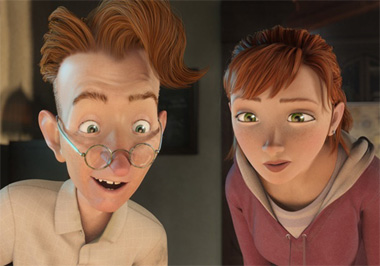Loosely based on William Joyce's children's book The Leaf Men and the Brave Good Bugs, Epic is the latest film adaptation to take advantage of a long history of narratives deeply rooted in America's conservationist imagination. So from the first scene, I was hoping that Epic would establish its own distinctiveness as not another green movie by approaching its common themes in compelling ways.

There are things about the premise—along with the film's visual animation—that make this a worthwhile trip to the woods. The most endearing image might be of the ingenious if flighty father, Professor Bomba—seen from the perspective of the tiny Leafmen and good bugs for which he's spent his life unsuccessfully searching—barreling into the forest with his microscopic glasses, which are specially designed for investigating a tiny forest world that he believes exists, despite it being naked to the eye. Bomba has long taught his daughter, Mary Katherine, that a war between the forces of good and evil is being waged in the forest. But if we are to see it, we must look closer by getting smaller. It's a commendable motto of humility, and it's also an invitation to inhabit a world fertile with detail, abundantly textured and lit, and luxuriantly vegetative enough to inspire concerns for its preservation. In this way, the film's a success.
One of the story's many conflicts is that Bomba's daughter, the film's teenaged heroine who wishes to be called "MK," not only doesn't believe her father's stories about the forest, but has also grown estranged from him. MK's disbelief and growing indifference stems almost wholly from the broken marriage between her father and late mother. Her mother left Bomba because of his seemingly delusional preoccupation with finding little human soldiers which he said were protecting and preserving the life that animates existence.
As you might expect, Leafmen actually do exist. And, in their miniscule world, a pivotal war is being waged between the life-giving forces of good—the Leafmen—and the decaying forces of evil—the Boggans. Representing the former is the magical Queen of the forest, Tara, and the Leafmen leader, Ronin. Leading the army of disgusting deterioration is Mandrake, who has malevolent plans to dispose of the forest. And so when Queen Tara goes to a field of leaf pods to choose an heir to the throne, her nemesis, Mandrake, seizes the opportunity to have the pod bloom into a darkness that envelops the forest.
Evangelical Christians have a complicated relationship with preserving nature, whether they're suspicious of "earth worship" or championing Wendell Berry. Yet Christianity does have deep roots that are in harmony with the Romantic concern for nature. Common sensibilities like the earth being our home, nature's connectedness, and how our inner nature's kinship with the larger natural world—all of these sentiments can be sensibly grounded in Christian soil. But sometimes the Christian roots have been cut out, deemed unnecessary, even hazardous, toward the goal.

Epic has exactly these sorts of narrative sensibilities, with a few too many bumper sticker-like comments strewn throughout. For instance: "we're all individuals, but still connected." Or in reference to our natural sensibilities, there are "some things you just know." Or that a great wealth of knowledge is to be found at Nim Galuu's tree, which has magic scrolls embedded in the rings. The Boggan territory is a "wasteland" of dead trees. The Leafmen and Good Bugs call human beings "Stompers," in what seems like a clear reference to our ecological "footprint."
And, perhaps most importantly, the film's sense of good and evil is mostly concerned with goodness as vitality and flourishing, and badness as deterioration and pollutant. Of course, this fits with a deeply Christian sensibility, but your sense of how the film handles these concerns will come from how sure you are that the film has a sturdy center.
And that's my most significant problem with Epic: its center isn't sturdy. There's simply way too much going on, and none of it comes together seamlessly enough. There's the estranged relationship between the girl and her aloof father. There's also the complication of a recently dead mother/wife. Add in the general battle between the Boggans and the Leafmen, the awkwardly hinted-at relationship between Queen Tara and Ronin, the relationship between the human beings' larger world and the Leafmen world—and I haven't even mentioned Nod yet, whose clichéd rebellious independence after the death of his father constantly leads to clashes with Ronin, his caretaker. Oh, and there's a bit of a romance between MK and Nod.
I haven't even exhausted some of the narrative threads in a film that is attempting nothing less than to be Star Wars by way of Avatar with small doses of Honey, I Shrunk the Kids and A Bug's Life. Presumably, this sort of juggling is the primary way the film is trying to be "Epic," but instead of being epic the film languishes in its ordinariness, too obviously straining for something more. It never quite inspires a rewarding sense of the heroic.
Another way of putting it is that Epic lacks what it needs to piece its narrative together, which—given the story's preoccupation with life's connectedness—is a pretty problematic irony. The most obvious (and telling) disconnect is that Professor Bomba's irresponsibility as a husband and father isn't matched with the idea of human beings' irresponsible relationship with the place we inhabit. That Bomba's vision of the forest's war of good and evil is, in fact, 20/20 renders his obvious shortsightedness as a father nearly unimportant. Because the film is framed as if his daughter and wife just didn't have eyes to see, Bomba's eventual apology to his daughter feels like a pointless formality. As such, in the film's world, the real problem sure seems to be that his wife and daughter didn't see the import of the environmental war, which is of ultimate concern—essential to "restoring balance."
So when Ronin says to MK, "Who gives up everything for a world that's not even theirs?", it's supposed to be setup for some kind of salvation, an ending of restored connectedness. Yet, the film's attempt to unite interpersonal and ecological ethics feels inconsequential at times, because there's no authoritative Creator—spoken or just palpably evident. A Creator would bind together person and place with a loving responsibility that makes sense of the essential creaturely status of stewardship.
Responsibility to people and place flows from the same source of cultivation, but I'm not sure this film can conceive of a purpose that's epic enough to support and color its wide-ranging—but often stereotypical and shallow—concerns. And that's a shame, because with its inventive and lively environment that's admirably visualized, Epic is a filmic world that I'd otherwise like to preserve in a DVD collection.











